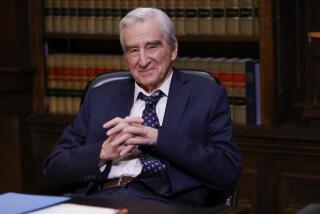TV Judge Takes His Message to the Stage
Judge Greg Mathis isn’t kidding when he says he’s been there, done that.
The tough-talking, popular television judge says he did what everyone else was doing to make it in the projects in his westside Detroit neighborhood during the 1970s. At age 11, he joined a gang.
“I chose survival over what appeared to be the pie-in-the-sky American Dream that I never saw anyone reach,” Mathis said.
As leader of about 40 gang members, Mathis got into fights and stole cars. He was expelled from a public elementary school, two church schools and three high schools before he dropped out in 10th grade.
He was spiraling downward fast.
He turned his life around though, and now, 1 1/2 years after the start of his nationally syndicated television show, he is taking his message of hope to 29 cities in a stage musical loosely based on his life called “Been There Done That.”
It has been drawing large audiences since opening Jan. 2 in Dallas. Before the show closes June 11 in Houston, it is scheduled to appear in St. Louis, Atlanta, New York and Chicago.
“It’s all part of my effort to get out and inspire people in overcoming their obstacles,” said Mathis, who portrays a judge, of course.
“Many people’s minuses pull them down,” said the Rev. Jesse Jackson, who met Mathis in the late 1970s. “But his minuses became pluses. His minuses became evidence of his capacity to overcome odds.”
Mathis, 40, credits his mother for working two jobs to send him to private school and for coming to visit him when he was sitting in a jail cell at age 17, convicted of carrying a concealed weapon.
When she made her first trip to the jail, she told Mathis he had been bad all his life, had humiliated her and “now I’m going to die.”
She had colon cancer. The news shocked him. He said he felt as if he had caused her cancer and thought, “If I could turn my life around, I could save her life.”
He read “The Autobiography of Malcolm X” while waiting to get out, and that was an inspiration too, he said.
Fulfilling his mother’s request--and the judge’s probation condition--to get himself together, Mathis obtained his high school equivalency degree within six months of leaving jail and entered Eastern Michigan University in 1978. His mother, Alice Lee, died during his third month in college.
In December 1982, he graduated with a degree in public administration and enrolled at the University of Detroit Law School.
“Malcolm wanted to be a lawyer and he couldn’t, and he was a great role model of mine,” Mathis said. “I just saw myself in Malcolm. He was in jail. I had been in jail. He did what I aspired to do, made a difference in public service.”
While attending law school at night, Mathis married his college sweetheart (they now have four children) and worked on a city councilman’s staff. After graduating, he served as a national assistant and Detroit campaign manager for Jackson’s presidential run in 1988, then went on to work as an assistant for Detroit Mayor Coleman A. Young for four years.
After passing the bar exam, the state bar denied him a license, citing his juvenile record. It took Mathis three years and three appeals to get it.
In 1994, he was elected a Superior Court judge in a campaign in which his opponent tried to use his criminal record against him.
“It turned out to be a positive, political success story,” he said. “That is how Hollywood became interested.”
In 1999, Mathis was lured to the popular television genre made famous by “The People’s Court” and Judge Joseph Wapner because Mathis was getting too few criminal cases.
With wry humor and wit, Mathis tells the plaintiffs and defendants to get on the right track. Once he told someone from the bench: “If you continue the way you’re going, the closest you’ll come to a car is making license plates.”
The show, “Judge Mathis,” airs locally at 10 a.m. weekdays on KCAL-TV Channel 9. It is aimed at working-class women and homemakers, he said. “They’re mothers and grandmothers still looking for solutions for how to deal with their children in such a hostile environment.”
Mathis said he tries to be “tough but compassionate” when dealing with people, because it was tough love by his mother that helped him.
More to Read
The biggest entertainment stories
Get our big stories about Hollywood, film, television, music, arts, culture and more right in your inbox as soon as they publish.
You may occasionally receive promotional content from the Los Angeles Times.










